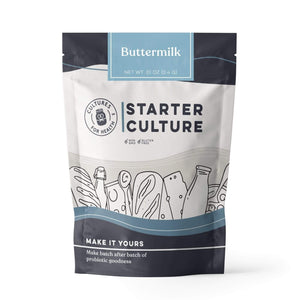
Making cultured butter at home is an easy way to take your butter to the next level! If you've ever made butter before, the you know that agitating cream is how to create butter. But to make fermented, cultured butter you first culture the cream. This creates a delicious extra layer of flavor. If you thought it wasn't possible for butter to taste better, you haven't tried cultured butter!
60 minutes
960 minutes
2
INGREDIENTS AND EQUIPMENT AVAILABLE AT CULTURES FOR HEALTH
Buttermilk Starter

Buttermilk Starter
$17.99
This heirloom culture makes batch after batch of traditional cultured buttermilk right on your countertop, easy as pouring milk in a jar. Bake with your buttermilk or add it to cream to make cultured butter.
Flora Danica Mesophilic Starter Culture
Mesophilic Aromatic Type B Starter Culture
How to Make Cultured Butter:
There are a variety of ways to culture your cream before you turn it into butter. Each will yield a slightly different flavor, as do small tweaks like fermenting your cream a little longer or at a different temperature.
STEP 1: CULTURE THE CREAM
The first step in how to make cultured butter is to culture the cream. You can pick a method of fermenting the cream and see which you like better. Use one of the following options to culture the cream. Cream may be either raw or pasteurized cream for all methods except the last one.
Yogurt or Buttermilk Cultured Butter
- For each cup of heavy cream, combine one tablespoon of either yogurt culture or cultured buttermilk. Mix well.
-
Culture 12-24 hours at 70º-77ºF
Direct-Set Sour Cream Starter Culture Cultured Butter
- Heat cream to 77°F
- Add 1 packet starter to 1-4 quarts cream. Mix well.
-
Culture at 74°-77°F for 16-18 hours.
Mesophilic Aromatic Cheese Cultured Butter
- Heat cream to 77°F
- Add 1/8 teaspoon of Flora Danica Culture or Mesophilic Aromatic Type B Culture to up to a gallon of cream. Mix well.
-
Culture at 74°-77°F for 12 hours.
- Add 1 teaspoon grains or 1 packet powdered starter culture to 1-4 cups cream. If using finished milk kefir, add 1 tablespoon milk kefir per cup of cream.
- Culture 12-24 hours.
- If using kefir grains, remove grains from cream before agitating the cream to make butter.
STEP 2: TURN THE CULTURED CREAM INTO CULTURED BUTTER
To start, remove the cultured cream from refrigerator and agitate it to form fermented butter. By far the easiest way to do that is with a stand mixer. But if you're willing to put in a little elbow grease, you can absolutely make cultured butter by hand.
Using a Stand Mixer to Make Cultured Butter
-
Place bowl in freezer for a few hours prior to making butter.
-
Place cold cream in bowl and turn the mixer on as high as possible without splattering the cream, monitoring carefully.
- Within 1-2 minutes, the cream will have thickened a bit. At this point, increase mixer speed. You want it to be agitating as much as possible without splashing cream.

-
Continue to monitor closely, as cultured butter may set quickly.
- Once butter pieces begin to form, reduce mixer speed to allow butter to further clump together. You may see it all collect around the whisk, making it easy to gather up.

Agitating Culture Butter by Hand
-
Place cultured cream in the fridge to chill the cream.
-
Pour cold cream into a large jar with a lid.
-
Shake the cream vigorously (good job for kids) until small balls of butter form. This shaking may take a while, but don't worry. If you keep at it, you'll see your cultured butter start to take shape.
-
Slow down the shaking so small balls of butter can clump together.
Final Step: Finishing Your Fermented Butter
-
Pour your cultured butter into a small bowl.
-
Wash butter with filtered water, pressing out any remaining buttermilk with a spoon. The buttermilk is the left over liquid after the butter has solidified.
- When the water runs clear, the butter should be free of buttermilk. Leaving buttermilk in the butter will cause the butter to spoil quickly, so you want to make sure that your butter is all pure butter.
-
Salt the butter and add herbs, if desired. Most store bought butter has added salt, so if it's not as flavorful as you were expecting, make sure to salt it up!
-
Wrap butter in wax paper and store in the refrigerator or freezer.
















